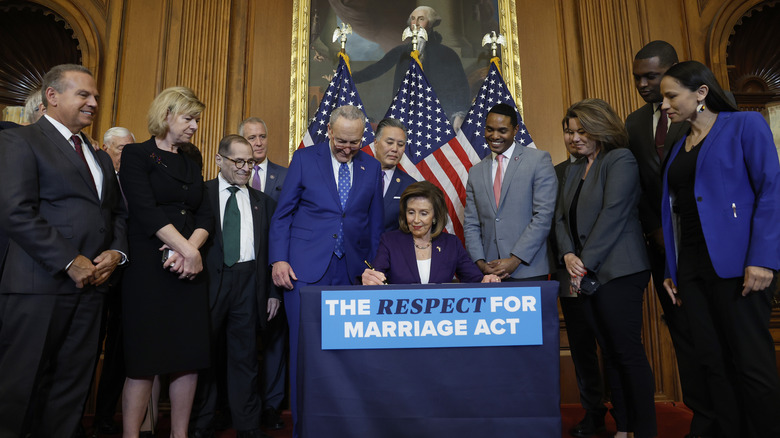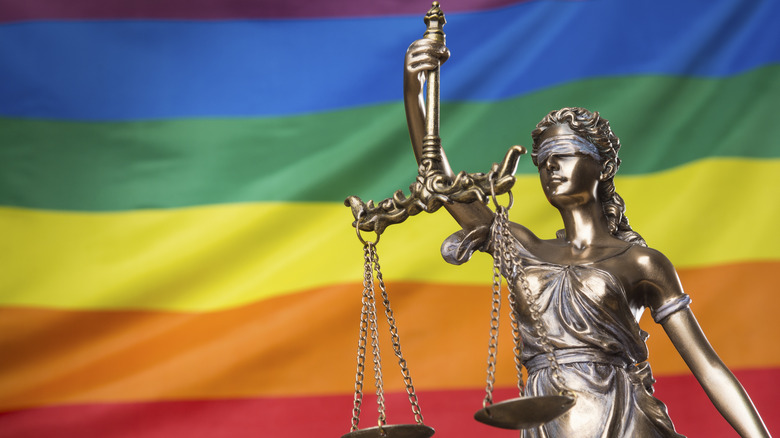What The Respect For Marriage Act's Passage Means For LGBTQ+ Couples And Families
When the Supreme Court overturned the 1973 Roe v. Wade decision on June 24, 2022, it meant that the right to abortion was no longer protected by the constitution. Instead, it would become an issue for each state to decide individually. It's left the country with a patchwork of varying laws and regulations state by state in regard to abortion rights. And some doctors fear for their jobs if they speak out against their local state bans.
With the overturning of Roe v. Wade, Justice Clarence Thomas wrote an opinion that seemed to show that he was ready for the Supreme Court to overturn additional previously settled cases for the same reasoning that Roe v. Wade was overturned, "including Griswold, Lawrence, and Obergefell," per The New York Times. In a nutshell, the Griswold case from 1965 allows legal access to contraception, Lawrence from 2003 made same-sex sexual intimacy legal, and Obergefell from 2015 made it legal for same-sex couples to get married.
One response to the 2022 Roe v. Wade decision and the potential for the reversal of decisions like Griswold, Lawrence, and Obergefell by the Supreme Court has been the Respect for Marriage Act (per People). It is an attempt to help prevent a complete loss of protections that same-sex couples have if Obergefell was to be overturned. The Respect for Marriage Act has a lot of implications for LGBTQ+ couples; here's what you need to know.
The Respect for Marriage Act overturns the Defense of Marriage Act
The Respect for Marriage Act was passed by the Senate 61-36 on November 29, and it passed the House of Representatives 258-169 on December 8 (via Reuters). The landmark bill just needs the signature of President Joe Biden to make it federal law. It overturns the Defense of Marriage Act, according to the federal government, defined marriage as between one man and one woman and gave states the right to refuse legal recognition of same-sex marriages from other states, NPR reported.
With the Respect for Marriage Act, the federal legal definition of marriage is between two individuals, with no sex/gender assignment, so long as the couple were married in accordance with state law. It also requires all states to legally recognize out-of-state marriages, regardless of "sex, race, or ethnicity," Reuters noted.
These echo parts of the decisions that the Supreme Court made in previous decisions, including the 2013 United States v. Windsor case — which determined that the federal government had to recognize same-sex marriages, the aforementioned Obergefell case, and the 1967 Loving v. Virginia case — which made it illegal for states to ban interracial marriages, per House Bill 8404. An amendment was added that confirmed non-profit religious organizations wouldn't have to officiate same-sex marriages or acknowledge them helped the bill gain bipartisan support (per NPR).
The act helps safeguard rights of same-sex married couples
Once the Respect for Marriage Act becomes law, even if Obergefell was overturned, a state could make it law to prevent same-sex marriages and refuse to issue a marriage certificate for one, but they would still have to legally recognize those marriages if they were legally performed in another state, per CNN. And there are plenty of benefits to a legally recognized marriage. For one, it ensures that LGBTQ+ couples get the same employee benefits in regard to things like childcare, parental leave, retirement, and health insurance, according to SHRM. Legal marriage also impacts social security benefits, tax status, inheritance rights, and alimony, Lynch & Owens, P.C reported.
32 states currently have laws on the books from before Obergefell that would mean if it fell, same-sex marriages couldn't be performed there, per NPR. And while Obergefell isn't currently being challenged in the Supreme Court, fears seem to persist that it might be, though this act will help. The Human Rights Campaign Government Affairs Director David Stacy told People that "the more we can just make this the way things are in this country the less incentive the Supreme Court has to muck around, the fewer challenges will come to the court around these issues and the more the public's with us."
The Respect for Marriage Act will impact millions of lives
Some people wish the Respect for Marriage Act did more. It doesn't prevent states from outlawing same-sex marriage if Obergefell does get overturned, according to Axios. But as one woman told USA Today, "[The act] brings about improvement of the quality of our lives by having that trust mentally and more importantly, emotionally. That as we're living our lives each and every day, that we have the same safeguards as others."
In a speech before the vote, House Speaker Nancy Pelosi said "Once signed into law, the Respect for Marriage Act will help prevent right-wing extremists from upending the lives of loving couples, traumatizing kids across the country, and turning back the clock on hard-work progress." Overseeing the House vote on the Respect for Marriage Act will be one of Pelosi's last duties as Speaker; Pelosi's stepping down from the House leadership role this year. In a statement from The White House, President Joe Biden said the passage of the act "will give peace of mind to millions of LGBTQI+ and interracial couples" and give "hope and dignity to millions of young people across this country who can grow up knowing that their government will recognize and respect the families they build."



